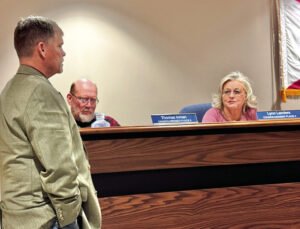Alabama’s low taxes are not equally applied
Alabama is the lowest tax state in the nation, according to census figures and federal officials. We collect less state and local taxes than any other state per person, and we are much lower than the national average.
Being the lowest in taxes means we squeeze more out of every tax dollar than any other state government because we have less of those dollars to work with, though we have the same responsibilities as other states in education, public safety, and transportation. The downturn in the economy reduced further the revenue for basic public functions, but we are still getting by and keeping the classroom door open and the courthouse lights on.
It is a point of pride to be last in taxes, the one place where being at the bottom is good. It is important to know that Alabama Democrats, who are in the majority in the statehouse, have been responsible for keeping our taxes the lowest.
Remember that when the political rhetoric and stereotyping begins.
Yet not every Alabamian pays the lowest taxes in the nation, and it really depends on your income level. When you look at the percentage of income going to state and local taxes, a different picture emerges.
Families with children who make under $60,000 per year do not pay the lowest taxes in the nation as a portion of their income. They pay less than the national average, but not the lowest. This is because of the way Alabama raises revenue, with a heavy reliance on sales taxes.
When you have kids that go through groceries and clothing, you end up spending more of the family budget on these items. You also pay taxes on these items.
Now, a couple making $300,000 a year does pay the lowest state and local taxes in the nation, and by a very large margin. First, buying things like food and clothing take up much less of a percentage of income, so the sales tax paid is a smaller portion. There are deductions that favor upper incomes in the Alabama system.
Other states also tax property at a much higher rate, while Alabama has the lowest property taxes in the nation by a wide margin.
So Alabama’s system does not tax people at the same rate. In essence, the more you make the less you pay in Alabama.
There is also a moral question to one particular tax we collect in Alabama: the sales tax on groceries. Our state is only one of two in the nation collecting state sales tax on a family’s daily bread. There is a reason almost nobody else does it—taxing such a basic necessity makes it that much more difficult to make ends meet.
It is something we should stop.
The problem is that state sales taxes are earmarked for education. Every penny collected by the sales tax goes to fund schools and they make up about 20 percent of all education revenue. Eliminating the food tax would blow a $500 million hole in the education budget that has suffered a $1.4 billion cut over the past two years.
Cutting education puts future economic growth at risk.
For the past decade, Rep. John Knight has proposed a bill to remove the sale tax on groceries, and make up the school funding by eliminating a portion of the federal income tax deduction on the state income tax. Alabama is also one of the few states that allow a full deduction on state income taxes for federal taxes paid.
Again, the more you make the more you deduct.
Knight’s bill stops federal deduction on state taxes for income over $200,000 to pay for the food tax elimination. It is a straight trade that affects only a fraction of people in Alabama.
It would provide an immediate break on every Alabama family’s grocery bill.
The bill, like in years past, went down to defeat on largely partisan lines earlier this month. The bill needed 63 votes to pass and could muster only 54.
Alabama still remains the lowest tax state in the nation, and it is a central principle for Democrats to keep it so. However, keeping it the lowest doesn’t mean we can’t make it fairer, and we should work to do so.
That is why the Knight bill will certainly come up again in the future.
Johnny Mack Morrow is a state representative for Franklin County. His column appears each Wednesday.







